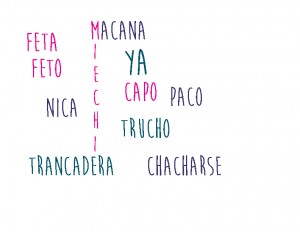
Even though Spanish is my mother tongue, I have found it difficult to understand some of the words and expressions used in Bolivia.
Hence, I created a list of the top ten words you should be aware of, if you are thinking about visiting this beautiful country.
- Ya [ja]: According to the Spanish Royal Academy, the official institution responsible for overseeing the Spanish language, ya means now. The same definition I have of the word as a Colombian. However, in Bolivia the word can also mean yes. So if you ask a Bolivian if they can do something for you, the may answer ya! which could mean that yes they are doing it now, or yes, they will do it at some point.
- Ya, is also an affirmation to understanding a sarcastic joke. However, this ya is a little bit easier to understand because they would say yaaaa! And it is often pronounced in a choir by a group of friends.
- Macana [maˈkana]: is the expression you use when someone tells you bad news. If someone says: I missed the bus and had to walk all the way. You must answer: que macana.
- Miechi [ˈmjeʧi]: is the Bolivian synonym of the Colombian word Erda, or the English holy cow. Expressions that come from a bad word, and are used when you are positively impressed by something. Miechi is the right expression, as long as you are with friends or family. Do not try it with strangers.
- Chacharse [t∫a 't∫ar se]: means to skip class, or work. If you want to tell someone they skipped an activity, you would say: te chachaste
- Paco ['pa ko]: is the nickname for policemen. The only explanation I found convincing for such nickname, is that in the Quechua language pak’u means blond, a colour used by policemen back in the 1800’s in Chile.
- Trucho ['tru t∫o ]: When something is fake, like a “Sansung” cell phone.
- Trancadera [traŋ ka 'ðe ra] : means traffic
- Capo ['ka po]: This was a really confusing word for me, because capo to a Colombian means drug dealer. In Bolivia it refers to someone who is really good at doing something. Bolivians even say capisimo, which is like a super capo.
- Nica ['ni ka]: when you ask someone to do you a favour and they answer nica, that means they won’t do it under any circumstances. Nica is the short version of an expression that I won’t be able to write, but will for sure explain to you, when you come by.
- Feto (masculine) [ 'fe to ] Feta (feminine) [ 'fe ta ]: is the Spanish word for fetus. Here it is used to refer to a kid that is being cute, or grownup acting like a child.
 Even though Spanish is my mother tongue, I have found it difficult to understand some of the words and expressions used in Bolivia.
Hence, I created a list of the top ten words you should be aware of, if you are thinking about visiting this beautiful country.
Even though Spanish is my mother tongue, I have found it difficult to understand some of the words and expressions used in Bolivia.
Hence, I created a list of the top ten words you should be aware of, if you are thinking about visiting this beautiful country.
